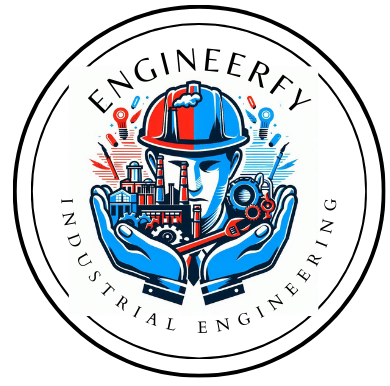What is Industrial Engineering and Why is it Important? Before I dive into this topic right away.
First, it is important to know that the Genesis of Industrial Engineering dates back to the Industrial Revolution.
It was initiated in the 1700s by Sir Adam Smith, Henry Ford, Eli Whitney, Frank Gilbreth, Lilian Gilbreth, Henry Gantt, Federick Taylor, etc.
Industrial Engineering is a bit of an unsung hero in the world of engineering.
It might not have the flashiness of cutting-edge electronics or the might of heavy machinery, but it is the discipline that keeps businesses running smoothly.
At its heart, Industrial Engineering is about designing, improving, and implementing processes that increase efficiency and productivity, all while minimizing waste.
Picture Industrial Engineers as problem solvers who refine and orchestrate how things get from point A to B most efficiently.

The field has its roots in the Industrial Revolution but has evolved dramatically with the advent of advanced technology and new management approaches.
Industrial Engineering today is an amalgamation of engineering science, management science, and even human factors.
The work of Industrial Engineers is evident in a variety of industries—from manufacturing and healthcare to entertainment and finance.
In a car assembly plant, they might design a more effective production line.
In a hospital, they could streamline patient intake.
This versatility is the reason Industrial Engineering is integral to operations in countless environments.
Understanding the diverse applications and the importance of Industrial Engineering sets the stage to explore it is direct impact not just on efficiency and cost-effectiveness but also on the broader objectives of innovation and sustainability.
The Interdisciplinary Nature of Industrial Engineering
Industrial Engineering stands out as a unique field due to it is extensive interdisciplinary nature.
Consider it the bridge between pure engineering principles and practical business applications.
Unlike other fields that may zoom in on specific tasks or materials, Industrial Engineering covers a broader spectrum.
At it is core, Industrial Engineering is about enhancing collaboration.
It intersects with electrical, mechanical, and chemical engineering to refine production processes.

Yet, it is reach extends to collaborating with other non-engineering domains, like business and management.
Industrial Engineers often work with these teams to make data-driven decisions that can transform how a company operates.
Let’s take a closer look at how Industrial Engineering makes these cross-disciplinary connections work.
For instance, Industrial Engineers often join forces with business analysts to streamline operations and supply chains.
They also pair up with human factors specialists to ensure that the working environment meets the needs of employees for optimal performance.
Bringing in case studies can solidify our understanding of Industrial Engineering’s interdisciplinary nature.
Take the automotive industry, where Industrial Engineers work alongside designers and material scientists to perfect the assembly line workflow and vehicle quality.
In healthcare, they collaborate with medical professionals to optimize patient care processes and reduce waiting times.
With a firm footing in both engineering and business realms, Industrial Engineers are well-equipped to innovate and optimize systems that span across various sectors.
As industries evolve and new challenges arise, the adaptable and collaborative framework of Industrial Engineering becomes even more valuable.
Why Industrial Engineering Matters: Enhancing Efficiency
Have you ever wondered why some companies seem to deliver products at lightning speeds while maintaining high quality?
Or how do hospitals manage to streamline patient care to save more lives?
The answer lies in the hands of Industrial Engineers.
They are the unsung heroes who enhance efficiency in every corner of industry and services.
By analyzing and optimizing processes, Industrial Engineers are key to reducing waste and unnecessary costs.
With their skills, organizations can achieve more with less, ensuring sustainability and competitive advantage.
Example after example, the value of Industrial Engineering shines through.
Consider the modern manufacturing plant: with methodologies like Lean and Six Sigma, Industrial Engineers dissect complexities to trim down processing times and minimize errors.
The result?
Products land in your hands faster and without draining resources.
Service industries, too, benefit from their expertise.
From optimizing schedules to improving supply chain logistics, Industrial Engineers keep our world moving smoothly.
But efficiency is not solely about speed; it is also about the responsible use of resources.
In the quest for sustainable practice, Industrial Engineering is pivotal.
They work tirelessly to implement systems that conserve materials and energy.
These systems not merely cut costs – they safeguard our planet for future generations.
By marrying the principles of efficiency with environmental stewardship, Industrial Engineers play a crucial role in shaping businesses that are both profitable and planet-friendly.
Their contributions are not limited to the industries you might expect.
They are actively involved in the healthcare sector, where even the smallest improvements can have life-saving implications.
Streamlining operational workflows in hospitals allows quicker patient turnover and the capacity to care for more individuals.
An Industrial Engineer’s touch helps ensure that medical professionals have the right tools at the right time, ultimately contributing to better patient outcomes.
The Impact of Industrial Engineering on Innovation and Design
Industrial Engineering is not just about enhancing efficiency; it is also a driving force behind innovation and design.
By it is very nature, Industrial Engineering is tasked with rethinking how products and systems are conceptualized, with an eye towards practicality and improvement.
In the design of products, Industrial Engineering plays a pivotal role.
Engineers balance the need for functionality with aesthetic appeal and ergonomics.
This means not only does a product have to work well, but it also has to be user-friendly and look good.
It is about creating something that people will want to use.
Workplace safety is another significant area where Industrial Engineering leaves it is mark.
Through the development of systems and controls, Industrial Engineers ensure that machinery operates safely and that work environments adhere to safety standards.
This results in fewer workplace injuries and a healthier environment for employees.
To give you a concrete sense of the impact, let’s look at an example.
Take the automotive industry, where Industrial Engineers have been instrumental in designing cars that are not only fuel-efficient but also comfortable and safe.

By working hand in hand with other engineering disciplines, the functionality of the vehicle is optimized, while ensuring the highest safety standards are met.
Leading into the future, the role of Industrial Engineering in innovation and design breeds optimism.
Especially, as we prepare to navigate a landscape filled with smarter technologies, connected systems, and challenges that demand sustainable solutions.
Industrial Engineering in the Future: What Lies Ahead?
As I stand on the precipice of the present, gazing into the future of Industrial Engineering, I see a landscape brimming with potential.
Industrial Engineers are set to become indispensable architects in a world that increasingly values efficiency, innovation, and sustainability.
Consider the emergence of Industry 4.0, where big data, the Internet of Things (IoT), and artificial intelligence (AI) are not just buzzwords but the building blocks of future industry practices.
Industrial Engineers will be the ones who harness these technologies, integrating them seamlessly into systems to enhance productivity and create smarter, more responsive processes.
The challenges ahead are as significant as the opportunities.
As industries evolve, Industrial Engineers will need to stay ahead of the curve, mastering new skills and adapting to the relentless pace of change.
Lifelong learning will be a cornerstone of the profession, and cross-disciplinary expertise will be more valuable than ever.
In addressing these challenges, Industrial Engineers will also be on the frontline of ethical and ecological decision-making.
Their unique position will empower them to lead in the pursuit of sustainable practices, ensuring that progress does not come at the expense of our planet.
The role of Industrial Engineers will expand beyond traditional boundaries, influencing policy, guiding technological adoption, and fostering an environment where innovation thrives.
In every machine that runs more efficiently, every process that minimizes waste, and every system that responds to human needs with grace, the fingerprints of Industrial Engineers will be evident.
So, yes, the future is bright for Industrial Engineering, and it is importance cannot be overstated.
As we adapt to and shape the forthcoming industrial landscape, one thing is clear: Industrial Engineers will not just witness the future; they will CREATE it.
Final Thought of What Is Industrial Engineering And Why Is It Important?
Industrial engineering is a field of engineering that focuses on optimizing complex processes, systems, and organizations to improve efficiency and productivity.
This discipline is crucial in a wide range of industries, including manufacturing, healthcare, transportation, and technology.
Industrial Engineers analyze systems, identify areas for improvement, and implement solutions to streamline operations and reduce waste.
By utilizing mathematical modelling, data analysis, and project management techniques, Industrial Engineers can help companies save time, money, and resources while enhancing overall performance.
In today’s competitive business landscape, Industrial Engineering plays a pivotal role in helping organizations stay ahead of the curve and remain successful in a rapidly evolving marketplace.
Ultimately, the importance of Industrial Engineering lies in it is the ability to drive innovation, increase profitability, and ensure sustainable growth for businesses across various sectors.

